black lives matter
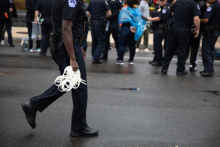
Less than a week into the new year, the country watched in shock as hundreds of rioters used metal pipes and tear gas against police to gain entry into the U.S. Capitol, ransacking congressional offices for several hours while the nation’s elected leaders, who had convened to certify electoral votes, huddled for cover. But faith-based communities and other justice advocates saw something like this coming.

The complaint, filed on behalf of Metropolitian AME church, alleges the attacks were part of “coordinated acts of violence.”
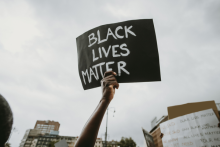
To be a Black woman in America and be relatively conscious, to paraphrase James Baldwin, is to be in a state of constant rage. Sweet holy songs don’t readily come to me. Christmas songs do not come to me. As a Black woman who happens to serve at a church that experienced white rage this past weekend when a group of demonstrators ripped down our Black Lives Matter banner and set it on fire, I am angry. And I’m tired.

“God is spirit, and those who worship him must worship in spirit and truth,” Jesus tells the Samaritan woman at the well in John 4:24. But when our worship is based in a denial of truth and runs counter to the nature and character of God is it truly worship? This is a question I have been pondering in considering a series of worship events organized by Sean Feucht, a vocal supporter of President Donald Trump, worship leader, and politician.
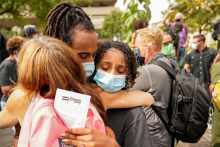
“The Grand Jury determined that there is no evidence to support a criminal violation of state law caused Ms. Taylor’s death,” said Attorney General Daniel Cameron.

“People want to start this narrative when the first building burns,” Howard told me in a phone conversation, “[but] I think it’s more useful to begin it years before. In the case of Omaha, people had been agitating to end racial discrimination as early as the 1940s.”
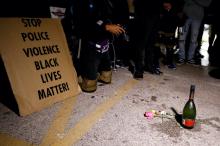
On Sunday, Aug. 23 at Jacob Blake was shot seven times in the back by Kenosha, Wis., police in broad daylight in front of his three sons ages 3, 5, and 8. The bullets damaged Blake’s spinal cord and left him paralyzed. His brutal shooting has not only left his body broken but it has also affected the psyche of his young children — another generation gripped by fear of police.

For many today, the Black freedom struggle has become a myth. Our ancestors are memorialized in their death while crucified in their life. For many, it has become a symbol of progress: a symbol of the progress of America, particularly white America, to finally “get it.” It is a powerful myth.
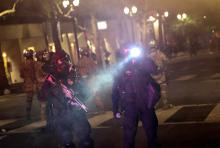
The writer, James Baldwin, stated in 1962, “It is, alas, the truth that to be an American writer today means mounting an unending attack on all that Americans believe themselves to hold sacred.” It is the truth that to be a person of faith in America today, is to recognize that America desires Jesus slogans over morally grounded Jesus-inspired action.
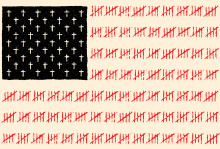
THE DARKEST HOUR, as they say, comes one sliver of a moment before dawn. We have been experiencing our nation’s darkest “day” since well before the moment the Confederacy fired its first shot at Fort Sumter in Charleston, S.C. That cannonball tore time in two, each successive battle of the Civil War ripping the sky farther and farther apart. After the war we saw stars, possibilities—the 13th and 14th and 15th Amendments to come.
Between May 28 and June 1 of this year, flames rose from numerous U.S. cities. One fire leveled a cinder-block structure that housed bathrooms and a maintenance office near the White House grounds. In the darkness we were forced to confront our hearts when tears filled our eyes as we watched a Starbucks burn, in the shadow of our numbed response when we first learned of George Floyd’s death—another Black person dead. Yes, property damage is mournful. The destruction is a crime because of the impact the losses have on people. But no, this kind of property damage is not “violent,” not in the manner of violence against people, which defaces the image of God, or against anything that holds the breath of God. Buildings are made by people, not by God. Nor do brick and mortar hold the breath of God. They do not feel. They do not have a family. Things can be replaced. Life cannot.
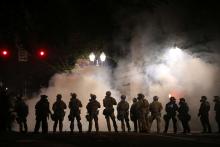
“As a community, we will resist such unconstitutional action by any morally rooted means we deem necessary,” said Rev. Dr. Otis Moss III. “We are a city of grit, grind and resistance, unafraid to speak truth to power.”
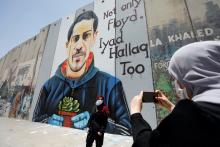
The tangled web of some U.S. and international evangelical and Pentecostal leaders blessing Israel’s expansionist ambitions toward the West Bank and more has a long and complicated history. President Trump has wrapped his political arms around those religious allies today in a craven attempt to preserve his evangelical base. But other Christians – including many prominent evangelicals – have consistently refused to condone Israeli occupation of Palestinian land as a supposedly “biblically sanctioned” real estate plan.
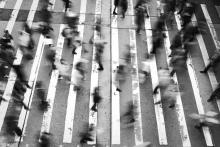
Living an embodied faith asserts meaning upon our bodies both as individuals, and in relationship to one another. This means that the places our non-white bodies inhabit tell a story in itself, just as God enfleshed “entered our lives, calling us from the tomb in which society has sought to confine us.” The shared space of believers living out the Christian faith in diverse, multi-ethnic communities is a witness to our world of the power of Jesus Christ.
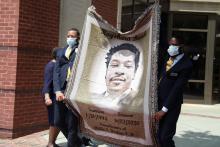
Whether their blood cries out from Valdosta Ga., or the Georgia Diagnostic and Classification Prison, their cries cannot go unanswered.
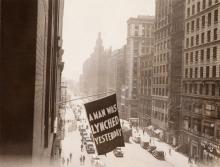
I’ve never been more scared for my Black son, but I knew this is what we had to do.
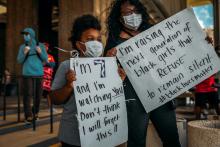
The phrase "Black Lives Matter," like Joseph’s request to take his bones wherever his people go, is to keep memory alive. To keep it alive is to fight for us when we can't fight for ourselves. It is to remind us that though our world may forget us, there is One who does not. So even as people shout loud “look how much progress this country has made; be grateful,” we understand that, as Angela Davis writes, “freedom is a constant struggle.”
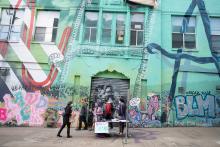
Late Monday afternoon, dressed in clerical garb, eight chaplains – three Jewish, three Unitarian Universalist, and two Christian – went into the six-block area originally called CHAZ (the Capitol Hill Autonomous Zone), along with their hand-drawn sign, a folding table, and a willingness to offer faithful presence for anyone who needed it.

That’s how fragile black life in the U.S. is. Our risk of being killed by police hinges on little things like the weather.

I am tired of white colleagues who have ignored the reports of microagressions and outright racism but are now posting black boxes on social media or reaching out to me with an “I love you.” They may mean well but it often feels so little and too late.

On June 5, nearly 1,000 people gathered for the Belle Isle Freedom March organized by Detroit resident and former mayoral candidate Ken Snapp in response to the death of George Floyd. The one-mile march echoed the 1965 Selma march with organizers calling for peace and unity.